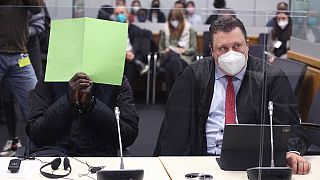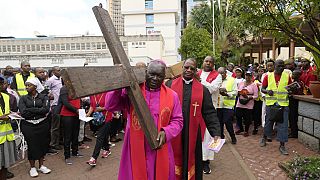Justice
Gambia's Truth, Reconciliation and Reparations Commission (TRRC) has submitted its final report on the crimes committed during Yahya Jammeh’s era to President Adama Barrow, recommending the government prosecute a list of officials, including the ex-leader himself.
As President Adama Barrow seeks re-election in the upcoming vote, victims who testified before the commission are concerned Barrow will not follow through with the report’s recommendations.
One of them is Mariama Marong Baldeh, wife of a victim.
"The commissions that have come before the TRRC, the recommendations were not implemented. What reason did the government give? That the recommendations are not given, they are not implemented" Baldeh says.
"There was no reason given and these are the things that can make somebody to have...to lose hope, or not to trust you 100%, if whatever you do, or whatever you say you will do, at the end of the day, you fail doing it. You fail the Gambian people". she stressed
The report comes after more than two years of truth hearings into Jammeh-era crimes. It was originally scheduled for release in July but has been delayed several times.
Publishing the report is politically sensitive in the West African country, where Jammeh has significant support.
The nation of two million people is also in the middle of a presidential campaign in which the return of the former dictator from exile has been a central theme.
TRRC officials handed President Adama Barrow their findings in a ceremony in the capital Banjul on November 25.
Witnesses gave chilling evidence to the TRRC about state-sanctioned torture, death squads, rape and witch hunts, often at the hands of the "Junglers", as Jammeh's death squads were known.
The TRRC has not been empowered to prosecute those responsible for crimes.
The contents of the report will not immediately be made public.
"What we cannot change is the history. What we cannot change are the facts. What we cannot change is that a number of people have been killed, tortured, and maimed in this country. So that cannot change. Even if any incumbent government didn’t do anything about it, that is not going to erase in the history books" Essa Jallow, head of Communication, Truth, Reconciliations and Reparations Commission (TRRC) explained.
For Reed Brody an American international lawyer for International Court of Justice ICJ, there is also the possibility of taking some of these cases to the International Criminal Court. "So we've seen the prosecutor of the International Criminal Court, we have seen UN working groups say that impunity is not an option".











01:45
Detainees released in Burundi as part of effort to reduce overcrowding in prisons
Go to video
Ghana's Supreme Court restores NPP's Parliamentary majority ahead of December election
01:02
Imane Khelif files legal complaint over reports alleging she has XY chromosomes
01:14
Nigerian children could face death penalty for taking part in protests
00:50
Victims call for Harrods boycott over Mohamed Al Fayed abuse allegations
00:38
Charges dropped: Binance executive freed by Nigerian court decision